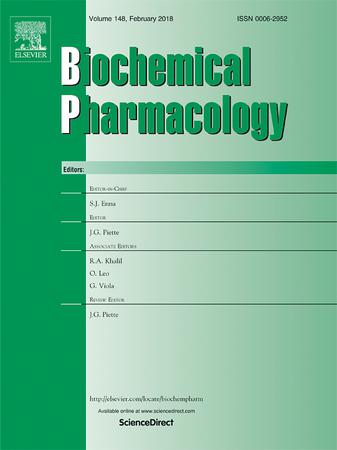一种新的生育酚衍生物抑制高脂肪饮食诱导的肥胖小鼠的肥胖。
IF 5.6
2区 医学
Q1 PHARMACOLOGY & PHARMACY
引用次数: 0
摘要
脂质积累在肥胖发病中起关键作用,加重代谢和炎症负担。然而,靶向抑制脂质积累的药物仍然有限。α-生育酚琥珀酸酯(TS)是α-生育酚(T)的琥珀酸酯,可抑制脂质积累,但具有细胞毒性(Majima et al., Biol)。制药。公牛2021)。我们之前开发了α-己二酸生育酚(Tadi)作为潜在的抗肥胖候选药物。Tadi是T的己二酸酯,被发现可以抑制脂质积累而没有细胞毒性(Yamasaki等人,Biochem Biophys Rep 2022)。然而,它的酯部分与酚羟基T的水解引起了对其化学稳定性和口服给药的担忧。在此,我们合成了一种新的α-生育酚衍生物,它是一种新的α-生育酚衍生物,它是Tadi的醚类似物,其中酯键被醚键取代。结构改造增强了塔迪对塔迪的稳定性。dTadi显著降低脂质积累,体外无细胞毒性。此外,在不改变体内食物摄入量的情况下,口服dTadi剂量依赖性地抑制了高脂肪饮食(HFD)喂养的C57BL/6J小鼠的体重增加(13% %- 20% %)。此外,dTadi以剂量依赖的方式显著降低血糖水平和血清甘油三酯浓度。dTadi治疗减少了附睾和腹膜后脂肪量,同时也减轻了脂肪肥大和减少了肝脏中的脂质积累。安全性研究表明,dTadi没有产生不良反应。最后,dTadi处理显著增加体外甘油释放、解偶联蛋白1 (UCP1)和脂肪酸β-氧化。这些结果表明,dTadi可能是一种潜在的口服抗肥胖药物。本文章由计算机程序翻译,如有差异,请以英文原文为准。

A novel tocopherol derivative suppresses obesity in high-fat diet-induced obese mice
Lipid accumulation plays a pivotal role in obesity pathogenesis, aggravating the metabolic and inflammatory burden. However, drugs targeting lipid accumulation inhibition remains limited. α-Tocopheryl succinate (TS), a succinic ester of α-tocopherol (T), inhibits lipid accumulation but exhibits cytotoxicity (Majima et al., Biol. Pharm. Bull 2021). We previously developed α-tocopheryl adipate (Tadi) as a potential anti-obesity drug candidate. Tadi is an adipic acid ester of T, and was found to inhibit lipid accumulation without cytotoxicity (Yamasaki et al., Biochem Biophys Rep 2022). However, hydrolysis of its ester moiety attached to the phenolic hydroxyl group of T raises concerns about its chemical stability and oral administration. Herein, we synthesized deoxo α-tocopheryl adipate (dTadi), a novel α-tocopherol derivative, which is an ether analog of Tadi, in which the ester bond is replaced by an ether bond. Structural modification enhances the stability of dTadi over Tadi. dTadi significantly reduced lipid accumulation without cytotoxicity in vitro. Moreover, oral administration of dTadi dose-dependently suppressed body weight increase (by 13 %-20 %) in high-fat diet (HFD)-fed C57BL/6J mice without altering food intake in vivo. Additionally, dTadi significantly reduced blood glucose levels and serum triglyceride concentrations in a dose-dependent manner. dTadi treatment reduced epididymal and retroperitoneal fat mass while also attenuating adipose hypertrophy and reducing lipid accumulation in the liver. Safety studies revealed that dTadi produced no adverse effects. Lastly, dTadi treatment significantly increased glycerol release, uncoupling protein1 (UCP1), and fatty acid β-oxidation in vitro. These results demonstrate that dTadi may be a potential candidate for an oral anti-obesity drug.
求助全文
通过发布文献求助,成功后即可免费获取论文全文。
去求助
来源期刊

Biochemical pharmacology
医学-药学
CiteScore
10.30
自引率
1.70%
发文量
420
审稿时长
17 days
期刊介绍:
Biochemical Pharmacology publishes original research findings, Commentaries and review articles related to the elucidation of cellular and tissue function(s) at the biochemical and molecular levels, the modification of cellular phenotype(s) by genetic, transcriptional/translational or drug/compound-induced modifications, as well as the pharmacodynamics and pharmacokinetics of xenobiotics and drugs, the latter including both small molecules and biologics.
The journal''s target audience includes scientists engaged in the identification and study of the mechanisms of action of xenobiotics, biologics and drugs and in the drug discovery and development process.
All areas of cellular biology and cellular, tissue/organ and whole animal pharmacology fall within the scope of the journal. Drug classes covered include anti-infectives, anti-inflammatory agents, chemotherapeutics, cardiovascular, endocrinological, immunological, metabolic, neurological and psychiatric drugs, as well as research on drug metabolism and kinetics. While medicinal chemistry is a topic of complimentary interest, manuscripts in this area must contain sufficient biological data to characterize pharmacologically the compounds reported. Submissions describing work focused predominately on chemical synthesis and molecular modeling will not be considered for review.
While particular emphasis is placed on reporting the results of molecular and biochemical studies, research involving the use of tissue and animal models of human pathophysiology and toxicology is of interest to the extent that it helps define drug mechanisms of action, safety and efficacy.
 求助内容:
求助内容: 应助结果提醒方式:
应助结果提醒方式:


